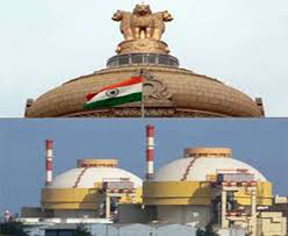 NEW DELHI: Moving to address the liability issue that has held up deals with various countries, the government has decided to form a Nuclear Insurance Pool which will have a number of stakeholders to meet the requirement of huge financial cover in case of a mishap.
NEW DELHI: Moving to address the liability issue that has held up deals with various countries, the government has decided to form a Nuclear Insurance Pool which will have a number of stakeholders to meet the requirement of huge financial cover in case of a mishap.
The Department of Atomic Energy (DAE) is pursuing the matter with the Ministry of Finance for creation of the pool after no single insurance company, including the General Insurance Company, expressed its ability to provide financial cover to the nuclear plants considering the huge monetary requirement.
Under the Liability Law, compensation of up to Rs 1500 crore will have to be paid in case of a mishap involving a nuclear plant.
At present, India has 20 nuclear plants and their number is expected to grow as the industry expands.
The move indicates the urgency to insure reactors, especially units 3 and 4 of the Kudankulam Nuclear Power Plant (KKNPP), under the Civil Liability Nuclear Damage Act (CLND), 2010. An agreement with Russia for setting up units 3 and 4 was signed recently.
This will also pave way for insuring big-ticket projects like Jaitapur Nuclear Power Project (JNPP) where French firm Areva is constructing 6 EPR reactors of 1650 MW each as also future atomic energy programs.
In a letter written last week to the Ministry of Finance, DAE has said the formation of Nuclear Insurance Pool should be “expedited” on “priority basis” as suggested by GIC.
The volume of the pool will depend on how the government contributes to it for every project.
Interestingly, in Canada, the nuclear liability law caps liability to an extent after which the government takes the responsibility of the remaining liability.
DAE and the Nuclear Power Corporation of India (NPCIL) had approached GIC for insurance. However, the public sector undertaking has said it does not have the capacity to insure the reactors in view of the high cost and also the number of reactors involved.
In response to an RTI filed by Greenpeace, an organization working in the field of environment, GIC had said that it was not offering any insurance to KKNPP units 3 and 4.
Sources claimed the reason for this was that the insurance company did not have the resources to insure such big-ticket projects.
DAE has an option of bringing in foreign insurance companies. The atomic agency is, however, strongly opposed to foreign insurance companies because with them come foreign inspectors whom the department does not welcome.
“We are not very keen to have foreign insurance companies as this will attract inspectors of those companies, something which the department is not comfortable with. More importantly, why should a hefty premium be given to foreign companies when something could be worked out internally,” said a government official.
This has led to the government to decide on forming the Nuclear Insurance Pool along with GIC in which several insurance companies or other entities could come together to build resources to insure reactors.
With countries like Canada and the United States having a sizable number of reactors, they also have nuclear insurance pool to deal with liability clause and also premium involved. Interestingly, the concept has been in practice in several western countries that have strict liability clause.
The US has Association of Nuclear Insurers while China too has this concept.-PTI





